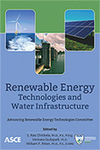Chapter 7
Sustainable Desalination Using Renewable Energy Sources
Publication: Renewable Energy Technologies and Water Infrastructure
Abstract
Freshwater production through desalination processes can be achieved by two major physical principles: evaporation/condensation and separation/filtration. This chapter explores some renewable energy technologies such as PV and wind turbines, which have reached maturity and have consequently provided economical applications in desalination. Conventionally, desalination processes are powered by energy derived from combustion of fossil fuels, which contribute to acid rain and climate change by releasing greenhouse gases as well as several other harmful emissions. The triple bottom line for assessing sustainability of a desalination process, which includes the critical components of environmental, economic, and social domains, is also discussed. Finally, several inconveniences to local communities resulting from construction of large desalination plants are considered, including closure of recreational facilities, local transportation, noise and air pollution and aesthetical depreciation, and inflow and outflow traffic resulting from transporting materials.
Get full access to this article
View all available purchase options and get full access to this chapter.
References
Ardente, F., G. Beccali, M. Cellura, and V. L. Brano. 2005. “Life cycle assessment of a solar thermal collector.” Renewable Energy 30 (7): 1031–1054.
Bitar, R., and A. Ahmad. 2017. Solar vs nuclear: Which is cheaper for water desalination? Policy Brief#2/2017. Beirut, Lebanon: AUB Policy Institute.
El-Dessouky, H. T., H. M. Ettouney, and Y. Al-Roumi. 1999. “Multi-stage flash desalination: Present and future outlook.” Chem. Eng. J. 73 (2): 173–190.
Dincer, I. 2002. “On thermal energy storage systems and applications in buildings.” Energy Build. 34 (4): 377–388.
Ghalavand, Y., M. S. Hatamipour, and A. Rahimi. 2015. “A review on energy consumption of desalination processes.” Desalin. Water Treat. 54 (6): 1526–1541.
Gude, V. G. 2011. “Energy consumption and recovery in reverse osmosis.” Desalin. Water Treat. 36 (1–3): 239–260.
Gude, V. G. 2015. “Energy storage for desalination processes powered by renewable energy and waste heat sources.” Appl. Energy 137: 877–898.
Gude, V. G. 2016a. “Desalination and sustainability—An appraisal and current perspective.” Water Res. 89: 87–106.
Gude, V. G. 2016b. “Geothermal source potential for water desalination—Current status and future perspective.” Renewable Sustainable Energy Rev. 57: 1038–1065.
Gude, V. G. 2018. “Use of exergy tools in renewable energy driven desalination systems.” Therm. Sci. Eng. Prog. 8: 154–170.
Gude, V. G., and V. Fthenakis. 2020. “Energy efficiency and renewable energy utilization in desalination systems.” Prog. Energy 2: 022003.
Gude, V. G., N. Nirmalakhandan, and S. Deng. 2010. “Renewable and sustainable approaches for desalination.” Renewable Sustainable Energy Rev. 14 (9): 2641–2654.
Gude, V. G., N. Nirmalakhandan, S. Deng, and A. Maganti. 2012. “Low temperature desalination using solar collectors augmented by thermal energy storage.” Appl. Energy 91 (1): 466–474.
Hamed, O. A., H. Kosaka, K. H. Bamardouf, K. Al-Shail, and A. S. Al-Ghamdi. 2016. “Concentrating solar power for seawater thermal desalination.” Desalination 396: 70–78.
Khan, M. A., S. Rehman, and F. A. Al-Sulaiman. 2018. “A hybrid renewable energy system as a potential energy source for water desalination using reverse osmosis: A review.” Renewable Sustainable Energy Rev. 97: 456–477.
NWC (National Water Commission). 2008. Emerging trends in desalination: A review. Waterlines Rep. Canberra, Australia: NWC.
Semiat, R. 2008. “Energy issues in desalination processes.” Environ. Sci. Technol. 42 (22): 8193–8201.
Younos, T. 2005. “Environmental issues of desalination.” J. Contemp. Water Res. Educ. 132 (1): 11–18.
Younos, T., and J. Lee. 2019. “Desalination: opportunities and challenges.” Water Environ. Technol. 22–27.
Younos, T., and K. E. Tulou. 2005a. “Overview of desalination techniques.” J. Contemp. Water Res. Educ. 132 (1): 3–10.
Younos, T., and K. E. Tulou. 2005b. “Energy needs, consumption and sources.” J. Contemp. Water Res. Educ. 132 (1): 27–38.
Information & Authors
Information
Published In
Renewable Energy Technologies and Water Infrastructure
Pages: 135 - 149
Editors: S. Rao Chitikela, Ph.D., Venkata Gullapalli, Ph.D., and William F. Ritter, Ph.D.
ISBN (Print): 978-0-7844-1585-6
ISBN (Online): 978-0-7844-8366-4
Copyright
© 2022 American Society of Civil Engineers.
History
Published online: Feb 10, 2022
Published in print: Mar 14, 2022
ASCE Technical Topics:
- Acid rain
- Buildings
- Business management
- Construction materials
- Desalination
- Economic factors
- Energy engineering
- Energy sources (by type)
- Engineering materials (by type)
- Environmental engineering
- Facilities (by type)
- Materials engineering
- Noise pollution
- Pollution
- Practice and Profession
- Recreational facilities
- Renewable energy
- Structural engineering
- Structures (by type)
- Sustainable development
- Water treatment
Authors
Metrics & Citations
Metrics
Citations
Download citation
If you have the appropriate software installed, you can download article citation data to the citation manager of your choice. Simply select your manager software from the list below and click Download.
